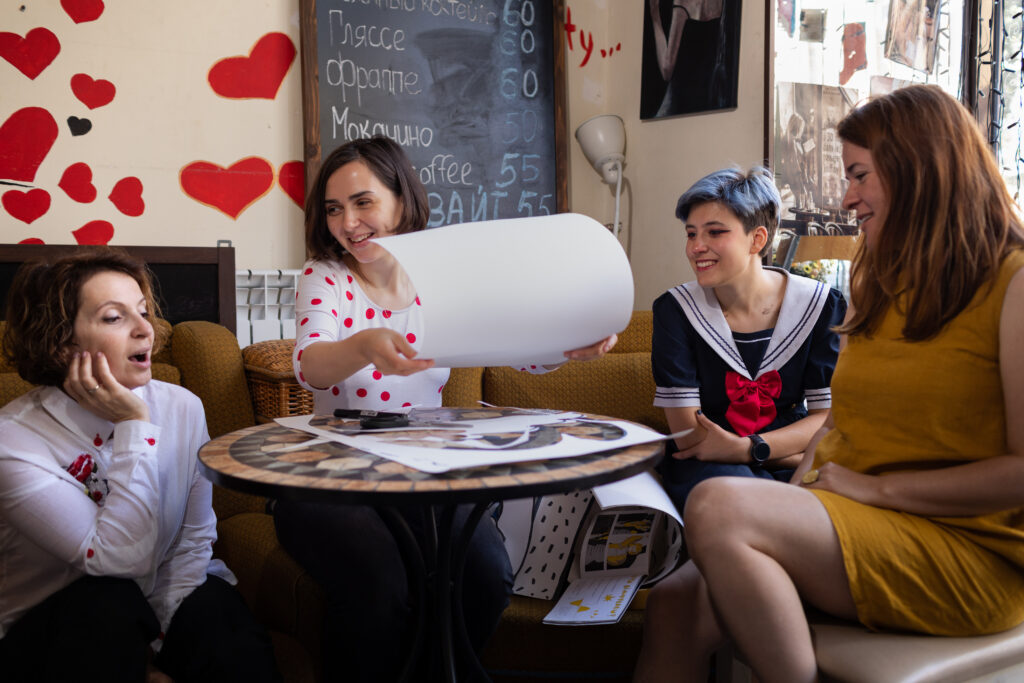‘I am not your cat’: a graphic novel informing young girls in Ukraine about ‘their sexual safety, their body and boundaries’
Last month, photographer Alexander Parkyn-Smith visited one of BEARR’s former grantees, Tolerspace in Kyiv, Ukraine. In 2019 they started their project creating a graphic novel “I am not your cat”, exploring issues of sexual harassment and consent among young women. Alex looks at the positive impact the novel has already had in Ukraine, and how the team at Tolerspace are expanding on the project now.

Anna Lenchovska, a psychologist specialising in work with teenagers, is the director of Kyiv Educational Centre: Tolerspace. Over the last two years, Anna has been working with a dedicated team to tackle important topics, often taboo and rarely discussed in public, such as the safety and security of young women and girls in Ukraine.
Anna described how their motivation lay in addressing a ‘feeling of insecurity amongst girls whom we work with in our youth projects, who say that they don’t feel safe in society, in public transport’. The challenge for the team was to find an accessible way of addressing serious topics, such as ‘cases of teenagers and children being victims of digital hate and also paedophilia, webcams and sexual exploitation of kids on the internet – unfortunately these are quite common issues in Ukraine and we wanted warn girls about them’.

Dana in Café Pled 
Sasha in Café Pled
Their solution, as Anna describes, is a graphic novel: “I am not your cat”. The novel is aimed at ‘informing girls, starting aged 12, about their sexual safety, their body and boundaries, and how they can combat harassment, stalking and other insecure stuff connected with their bodies and sex’.
Dana Verstak, the graphic designer and illustrator who collaborated on the project, described the form and content of the graphic novel: ‘It is in an A5 format, in black, white and yellow – we wanted it to appear neutral and positive’. The novel, illustrated with bold-outlined characters, is organised into common scenes that young girls may find themselves in.

Inspired by a workshop she attended on how to create a comic character, Dana embraced the accessibility of the format, explaining how, ‘it’s just very modern. Teenagers read a lot of comics; they don’t tend to read a lot of big texts, but they look at pictures. Visuals are much better for young people now. They are easy-going and seem very friendly when you look at the book. The images are pretty cute, even when the topics are not.’
Dana described an example of a scene ‘in the cinema with a boy and girl – girlfriend and boyfriend. It’s about the culture of consent’. ‘Usually when young girls aged 12 have just started dating, they are not sure when they should go further in their relationships with regards to touching, maybe some sexual things. This chapter it is all about discussing that. It shows that it is OK to say ‘no’ if you are not ready for something. The boy in the comic is trying to hug the girl, in a more intimate way, while they watch a movie, and she is not very ready for this. There are also a lot of thought bubbles showing what other people might be thinking about the situation’.

In a second scene, the girl is sexually harassed on a busy public tram. ‘It happened to me when I was a child, it happened to almost every girl… as well as some boys I know. I remember this feeling – is this happening, or is it just something I am imagining? … Maybe something is wrong with me – I don’t know. I really didn’t know how to react’. The comic helps with these situations by saying, ‘you can go and tell somebody. You can ask for help.’

The project came together organically, through a group of colleagues meeting fortnightly in a quirky café in the Podil neighbourhood of Kyiv. The team produced a list of possible topics, drawing on their own knowledge and experience. For example, Child Psychologist Sasha Chirkova brought examples from her professional experience to meetings, with Dana creating illustrations around the emerging themes between meetings.
Anna describes how BEARR’s support was crucial for the project, allowing them to pay the artist, print 500 copies of the comic, and conduct training with peer guides:
‘We had 13 girls there aged 12-13 years old. I was really surprised by them saying how unsafe they felt – they wanted to talk about it with their classmates and friends. They took this graphic novel with them after the peer-guide training, and we planned how they could have such discussions with their peers. The graphic novel was a good starting point: you give someone an object, which she can open, read, and then ask questions about. You do not need to address all of the topics directly.’
The comic was released in March 2020. With initial plans disrupted by Ukraine’s first Covid-19 lockdown, it was launched online and later in-person at Docudays human rights film festival where Anna says it had a ‘really great reception with 200-300 in the audience for their presentation.’ After the launch, they started to receive orders from educators from all over the country. The novel was ‘used in classrooms, with children, and with clients who were girls.’

Anna spoke excitedly of their plans for the future of the project. This includes printing more graphic novels for girls and applying for funds to undertake further peer-guide training for girls, ‘because at this age, it’s what really works. Not an adult speaking to them but a peer. Also, many people have asked us, ‘what about boys!’, so we have started working on a boy’s comic’. With an engaging form and by tackling important issues, Tolerspace is well-placed to further their important work in Ukrainian society.
Text and photos by Alexander Parkyn-Smith
Alex@myriadfilm.com
Portfolio Website
11 October 2021

